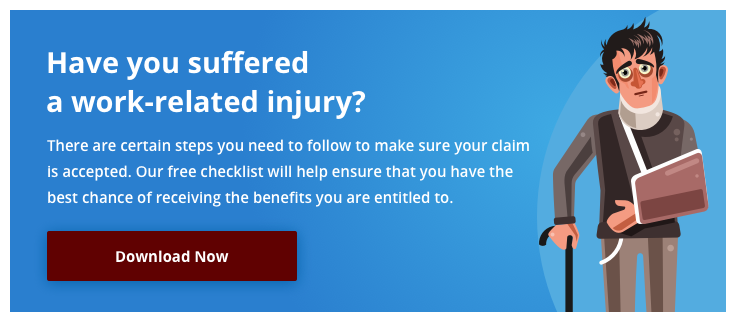 Workmans comp (now known in California as workers’ compensation) is a state-regulated mandatory insurance benefit program that employers must provide to employees. The program provides benefits to employees who suffer on-the-job injuries. There are times, however, when a claims administrator refuses to approve the payment of benefits. When that refusal is not legally justified, a Santa Rosa workers’ compensation lawyer at Kneisler & Schondel can help injured employees obtain the benefits they deserve.
Workmans comp (now known in California as workers’ compensation) is a state-regulated mandatory insurance benefit program that employers must provide to employees. The program provides benefits to employees who suffer on-the-job injuries. There are times, however, when a claims administrator refuses to approve the payment of benefits. When that refusal is not legally justified, a Santa Rosa workers’ compensation lawyer at Kneisler & Schondel can help injured employees obtain the benefits they deserve.
To help injured workers understand how the law works, here are some examples of situations in which a workers’ compensation insurance company may not pay benefits for an injury.
Injuries Not Job-Related
The workers’ compensation system provides benefits to employees whose injuries or health conditions are job related. Workers comp is not a full health care plan and is not a substitute for health insurance. Injuries and diseases that are unrelated to a job do not entitle employees to workers’ compensation benefits.
Workers’ compensation insurance companies sometimes dispute the cause of an injury or health condition. When a coverage dispute arises, a Santa Rosa workers’ compensation lawyer can help injured workers establish their entitlement to benefits for job-related injuries and diseases.
Injured Worker Not an Employee
Although the name workers compensation suggests that compensation is available for all injured workers, only injured employees are eligible for benefits. A self-employed independent contractor who is working on a jobsite will not likely be entitled to workers’ compensation benefits.
Some businesses improperly classify employees as independent contractors to avoid paying them overtime, unemployment benefits, and workers compensation insurance premiums. By some estimates, as many as 30% of independent contractors in California should be classified as employees. An injured worker who should have been classified as an employee is entitled to workers’ compensation benefits for job-related injuries.
A worker whose time is exclusively devoted to tasks assigned by the same business, who is given specific directions about how those tasks must be performed, whose work is performed at the location of that business, and whose work is closely supervised may be an employee even if the worker has been classified as an independent contractor. Since the distinction between an employee and an independent contractor is not always clear, injured workers should consult with a Santa Rosa workers’ compensation lawyer if they believe they have been misclassified.
Unpaid volunteers may not be eligible for workers’ compensation benefits. Volunteers often work for nonprofit organizations. Some of those organizations, however, choose to cover volunteers in order to protect themselves from personal injury lawsuits that a volunteer might file after being injured on the job. Volunteers should obtain legal advice about their options if they sustain a job-related injury.
Employee Received No Medical Treatment
Being injured at work does not guarantee the payment of a benefit. Ane injured worker must either miss work or obtain medical treatment, or both, before any benefits must be provided.
Workmans comp insurance pays the medical expenses of injured employees. If an employee suffers an injury but does not seek medical treatment for it, there will be no medical expenses to pay. In the absence of treatment, an employee will not likely qualify for temporary total disability benefits.
Employee Does Not Qualify for Temporary Total Disability Benefits
In addition to paying medical expenses, workers’ compensation insurance provides a form of income replacement when an employee misses time from work. That benefit, known as temporary total disability (TTD), is paid when an injured worker is hospitalized overnight or when a treating physician determines that the injured worker will be unable to work for more than three days. An injured worker who suffers an injury but is not hospitalized and misses no time from work, or returns to work after missing no more than three days, will not receive disability benefits.
Finally, an injured worker may not receive TTD benefits if her treating physician releases her to work light duty and the employer offers appropriate light duty work. The injured worker will receive no disability benefit because this benefit is intended to replace lost wages, and a worker who continues to earn wages generally experiences no financial loss.
Permanent Disability is Disputed
Permanent disability benefits are paid after the injured workers’ treating physician determines that the injury will not heal further and will never heal completely. At that point, the injured worker is entitled to compensation for the permanent impairment that was caused by work.
There is sometimes no dispute about a treating physician’s determination that a permanent impairment exists. As was noted above, there may be a dispute about whether the impairment, or how much of the impairment, is job-related. In addition, injured workers and claims administrators often disagree about the severity of the impairment and the disability rating that should be assigned to it. The disability rating determines the permanent disability benefit that the injured worker is entitled to receive.
When disputes about a permanent disability rating arise, an experienced Santa Rosa workers’ compensation attorney can help assure that full benefits are paid. If a workers’ compensation insurance company will not pay benefits for your injury, call Kneisler & Schondel at (707) 542-5132 or use our online contact form.
